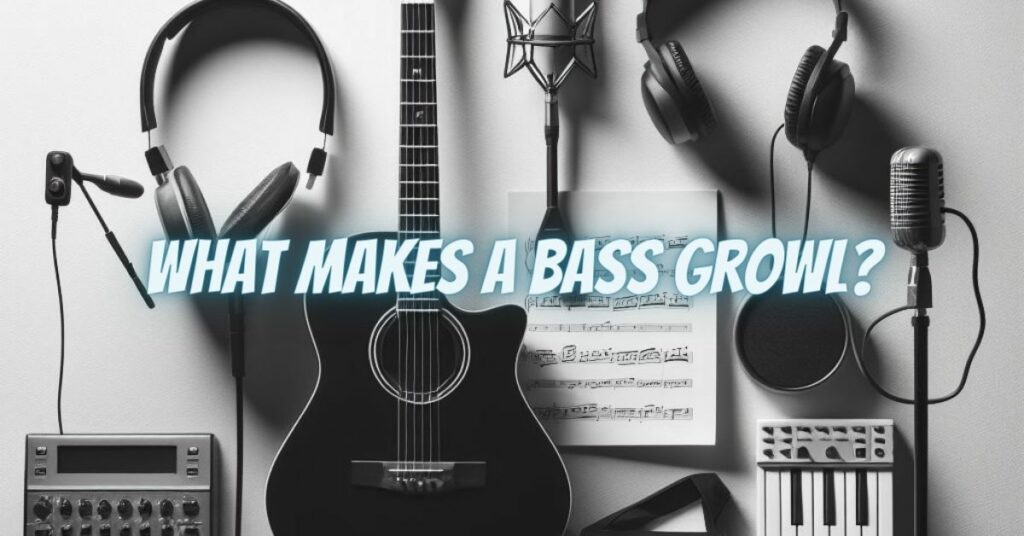The growl of a bass guitar is a distinctive sound that is often associated with rock and metal music. It is a low, guttural sound that can be both aggressive and menacing. But what exactly makes a bass growl?
There are a few factors that contribute to the sound of a bass growl. One factor is the type of bass guitar itself. Some bass guitars are simply better at growling than others. This is because of the design of the bass guitar, including the type of wood used, the type of pickups, and the scale length.
Another factor that contributes to the sound of a bass growl is the way that the bass guitar is played. Bass players who want to get a growl sound will often use a variety of techniques, such as playing with the fingers instead of a pick, using a heavy attack, and playing close to the bridge.
Finally, the sound of a bass growl can also be affected by the way that it is amplified and recorded. Bass players who want to get a growl sound will often use a powerful amplifier with a lot of gain. They may also use effects pedals, such as overdrive and distortion pedals, to further enhance the growl sound.
Here is a more detailed breakdown of each of these factors:
Bass guitar
The type of bass guitar can have a big impact on the sound of a growl. Some bass guitars are simply better at growling than others. This is because of the design of the bass guitar, including the type of wood used, the type of pickups, and the scale length.
Bass guitars made of maple or ash are typically better for growling than bass guitars made of mahogany or rosewood. This is because maple and ash are denser woods that produce a brighter sound. Bass guitars with humbucking pickups are also typically better for growling than bass guitars with single-coil pickups. This is because humbucking pickups produce a fatter and more aggressive sound.
Finally, bass guitars with a shorter scale length are typically better for growling than bass guitars with a longer scale length. This is because shorter scale length bass guitars have less tension on the strings, which makes it easier to get a growl sound.
Playing technique
The way that a bass guitar is played can also have a big impact on the sound of a growl. Bass players who want to get a growl sound will often use a variety of techniques, such as playing with the fingers instead of a pick, using a heavy attack, and playing close to the bridge.
Playing with the fingers instead of a pick can help to produce a more aggressive sound. This is because the fingers can pluck the strings harder than a pick can. Using a heavy attack can also help to produce a growl sound. This is because a heavy attack will cause the strings to vibrate more, which will produce a more aggressive sound. Finally, playing close to the bridge can also help to produce a growl sound. This is because the bridge is where the strings vibrate the most, which will produce a brighter and more aggressive sound.
Amplification and recording
The way that a bass guitar is amplified and recorded can also affect the sound of a growl. Bass players who want to get a growl sound will often use a powerful amplifier with a lot of gain. They may also use effects pedals, such as overdrive and distortion pedals, to further enhance the growl sound.
A powerful amplifier with a lot of gain will help to produce a louder and more aggressive sound. Overdrive and distortion pedals can also help to produce a growl sound by adding harmonics and distortion to the signal.
So, what makes a bass growl? There are a few factors, including the type of bass guitar, the playing technique, and the amplification and recording. Bass players who want to get a growl sound can experiment with different combinations of these factors to find what works best for them.
Here are some additional tips for getting a bass growl:
- Use a pick with a sharp edge. This will help to produce a brighter and more aggressive sound.
- Play with the fingers and pluck the strings hard. This will also help to produce a more aggressive sound.
- Play close to the bridge. This is where the strings vibrate the most, which will produce a brighter and more aggressive sound.
- Use a powerful amplifier with a lot of gain. This will help to produce a louder and more aggressive sound.
- Use overdrive and distortion pedals to further enhance the growl sound.
Experiment with different combinations of these factors to find what works best for you and your bass guitar.


